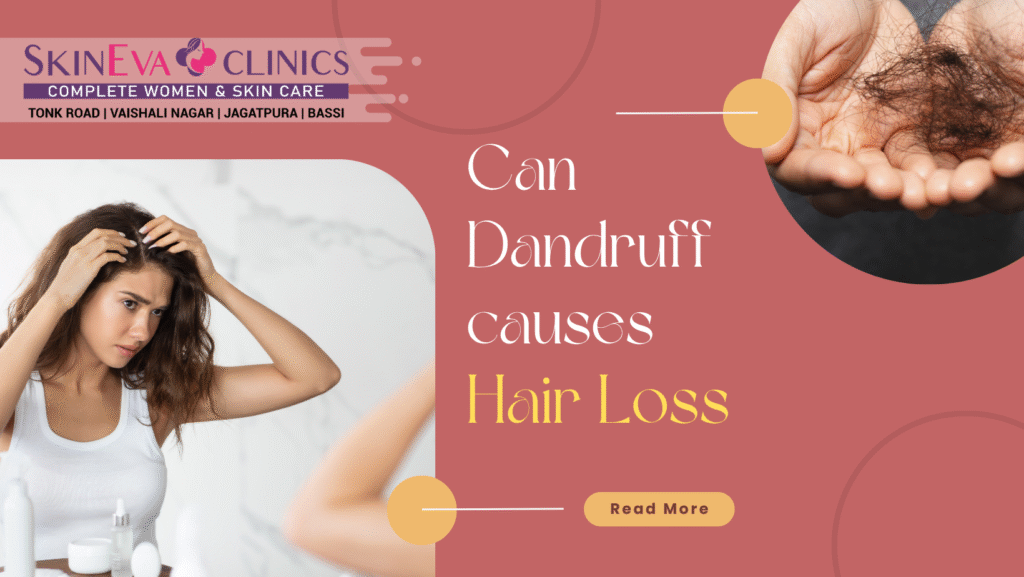Can Dandruff causes Hair Loss

Introduction:
Dandruff is something most of us have dealt with at some point — those dry white flakes on your shoulders and the constant urge to scratch your scalp can be both annoying and embarrassing. While it’s often brushed off as a harmless cosmetic issue, many people begin to worry when they notice it alongside increased hair fall. This raises an important and frequently asked question: Can dandruff actually lead to hair loss?
In this blog, we’ll uncover the real relationship between dandruff and hair fall, discuss how it might contribute to hair thinning, and offer practical solutions to keep your scalp healthy and your hair strong.
Can Dandruff Cause Hair Loss?
Dandruff is a widespread scalp issue that affects people across the globe. It typically shows up as white flakes, an itchy scalp, and sometimes redness or soreness. Although it’s often considered a minor concern, many people wonder if dandruff could be doing more harm than just causing embarrassment. Could those tiny flakes actually be linked to hair fall? It’s not a straightforward yes or no — the truth is a bit more nuanced.
Let’s take a closer look at how dandruff and hair loss may be connected.
Does Dandruff Directly Lead to Hair Loss?
Not exactly. Dandruff itself doesn’t directly result in hair falling out. That’s because the flakes affect only the outermost layer of the scalp, while hair follicles lie deeper underneath. However, in chronic or severe cases, dandruff can still influence hair health indirectly. Persistent itching and inflammation caused by dandruff can gradually create an unhealthy scalp environment, encouraging hair shedding.
How Dandruff May Contribute to Hair Fall
Here’s how dandruff can set off a chain reaction that affects hair health:
- Itchy Scalp and Constant Scratching
When your scalp itches due to dandruff, frequent scratching can harm the scalp surface and weaken the hair roots. This repeated irritation may cause increased hair shedding.
- Inflammation of the Scalp
Dandruff, particularly from conditions like seborrheic dermatitis or fungal overgrowth, often causes scalp inflammation. Long-term inflammation can damage the hair follicles, making them less stable and contributing to hair fall.
- Clogged Hair Follicles
A mix of flakes, sebum (natural oil), and dirt can block hair follicles. This obstruction can disrupt the natural hair cycle, eventually slowing or stopping hair growth.
- Underlying Scalp Conditions
Sometimes, what appears to be dandruff is actually a sign of another scalp condition — like eczema, psoriasis, or fungal infections — which are known to cause hair thinning or loss alongside flaking.
The Hair Growth Cycle and Dandruff
Your hair grows through three phases:
- Anagen (growth)
- Catagen (transition)
- Telogen (rest/shedding)
Although dandruff doesn’t directly alter this cycle, the irritation and inflammation it causes can reduce the time your hair stays in the growth phase. Additionally, hormone-related factors like DHT may also play a part in damaging follicles and worsening scalp issues, including dandruff.
Can Dandruff Lead to Hair Thinning or Balding?
Dandruff by itself doesn’t cause baldness, but if left untreated, it can lead to hair becoming noticeably thin — especially if linked to:
- Seborrheic dermatitis
- Scalp psoriasis
- Fungal infections (e.g., scalp ringworm)
These scalp conditions can trigger chronic inflammation or even leave scars, both of which interfere with healthy hair growth. So, while dandruff may not be the root cause of baldness, over time and without care, it could become a contributing factor.
Tips to Prevent Hair Fall Due to Dandruff
Want to stop dandruff from affecting your hair? Here’s what you can do:
- Use a dermatologist-recommended medicated shampoo for your specific scalp issue.
- Consider natural options like tea tree oil, neem, or aloe vera only under expert guidance.
- Cut down on oily and sugary foods — they can trigger excess oil and worsen scalp conditions.
- Reduce stress through meditation, regular exercise, or mindfulness practices.
- Be gentle with your hair: avoid frequent heat styling and harsh brushing.
Final Thoughts
Dandruff doesn’t directly make your hair fall out, but it can cause enough scalp damage to weaken the hair roots if left unchecked. Keeping your scalp healthy, treating dandruff early, and getting medical advice when necessary can help prevent more serious hair problems.
If you’re noticing flakes and increased hair shedding, don’t ignore the signs. A visit to a skin or hair specialist could help protect both your hair and your confidence.




Leave a Comment